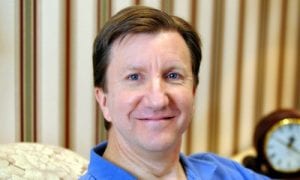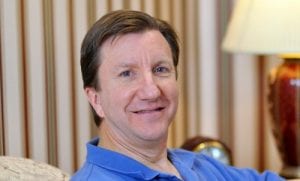 “Math was a strong point for me in high school, but I was more interested in concrete and practical applications than theoretical or abstract math at the higher level so I landed in Computer Science,” said Rice University alumnus Peter Taggart (BA ’81).
“Math was a strong point for me in high school, but I was more interested in concrete and practical applications than theoretical or abstract math at the higher level so I landed in Computer Science,” said Rice University alumnus Peter Taggart (BA ’81).
Although he was one of the first Rice students to earn a CS degree, Taggart initially began his university experience in a Bible college. He arrived at Rice as a transfer student in January 1979, when computer technologies and software development seemed to be the industry of the future.
He said, “To be honest, CS was a fledgling program, run out of the basement of Herman Brown. Between the location and the types of people found there, it had this sense of being a rogue operation. And yet, it was a first-class professional program with professors like Kennedy, Sinclair, and Hirschberg out there at the front of the industry.”
In those formative years, Taggart said the program’s focus was already on concepts rather than the code. “It was crystal clear that we were being trained as computer scientists, not as programmers. We weren’t focused on BASIC, we were learning compilers and machine learning. I walked out of that program with an understanding of how a computer works that hasn’t really changed to this day.”
Although how a computer works is still the same, the equipment itself had begun a rapid metamorphosis. The first group of Rice CS majors had been trained on punch cards and an IBM36P mainframe. As Taggart and his classmates approached graduation, they felt brave enough to give up their punch cards and begin typing their code directly into the system.
He said, “It was an exciting time. One of our classmates dropped out of school because he could make $30K programming microprocessors. We were running Election Central out of the basement of Herman Brown, processing phoned-in poll results for the Houston news media. Two of the people in that basement were already working on Apple IIs. We could see the changes occurring all around us and it was obvious that we were on the cutting edge of a quickly evolving industry.”
The methods Taggart learned as a CS student served him well, particularly as his career evolved into managerial responsibilities. He said his orientation as a CS major included a statement from the faculty that they wanted students to know (and not just think they knew) how to do things.
“They said, ‘We want to teach you to do things the right way, not the wrong way.’ Learning to think about and plan to achieve the overarching goal has helped me manage projects, particularly how to order a project and quickly identify the flow,” said Taggart.
“We had to have strong convictions about how things should be, and that kind of thinking also works well for leaders. Does the org chart make sense? Does the information make sense? The practice of team programming, where one group creates a module that impacts the next module — I use that all the time. For example, where does the finance department end and the next department begin?”
Taggart’s path took an unexpected turn back to the Stevens School of the Bible, where he put his systems skills to work after completing their seminary program. The college was converting their bookkeeping processes from manual to an automated system and Taggart was hired to manage the transition due to his combined computer software and institutional knowledge.
“I was applying computer applications to business office practices, which placed me in the world of financial officers. I had to learn accounting, and that experience launched me on a trajectory I never left.
“Now, fast forward 15-20 years. I’m working at Greater Grace Church in beautiful Baltimore, Maryland. We’re located on the cusp of the city, which has its rough parts, and the county, which is more middle class. Looking out my window at the apartment complex next door, I realized the parking lot looked like an open-air drug market. I was thinking, ‘We’re here in the church, we’re God’s people, and we should be concerned about that situation and how it’s impacting the people who live there.’ So I got a group of guys together to come up with a solution.”
Soon after organizing as a non-profit corporation, the group had an opportunity to buy the apartment complex. They went to work to clean up the area, making it a safe environment for families and single people.
“What we do is transform neighborhoods, both in my work at the church and my work in the Moravia Park Community Development Corporation. It requires a lot of day-in, day-out hard work that bears fruit over the long haul,” said Taggart.
He described the absentee landlord problems faced by many residents of low-income communities in large cities. Property owners may not care what occurs in individual spaces if the rent is paid in a timely manner, and landlords who dwell elsewhere seldom recognize gradual changes. For example, Taggart said the security of an entire floor or wing of a complex can be jeopardized when one aging tenant allows her grandchild to move in, if they bring a harmful environment with them. The tenant might not even understand the activities happening right under her nose.
Taggart said, “When you look at communities with very serious problems, I believe 95-99% of the people living in those neighborhoods don’t want those problems and aren’t part of the problem. But how do you root out the 1% that is truly evil and support the rest who legitimately need a helping hand?
“Many times, the powerless have not been treated well during their lives. Our approach is to treat our tenants with dignity and help them secure a livable home for themselves, even at the lower end of the spectrum.”
Taggart’s corporation struggles with the same kind of income challenges as their tenants. The investors had big hearts and small wallets; they purchased the complex with $1000 down and financed the rest. He said they were highly dependent on the rent income to survive, and they could only fund the gradual transformation of the complex out of their operations budget.
 “We’re an underfunded organization and walked into the project with nothing. We couldn’t come in and clear the place out, we could only clean out the parking lot and a few other egregious situations. With the major problems out of the way, we could begin looking at individual units.
“We’re an underfunded organization and walked into the project with nothing. We couldn’t come in and clear the place out, we could only clean out the parking lot and a few other egregious situations. With the major problems out of the way, we could begin looking at individual units.
“Over the last 10 years, we’ve been trying to get each unit to a level we can be proud of. I ask myself, ‘Could I move my wife in there?’ If she couldn’t live there, I wouldn’t want to be renting it to anyone else. It’s been a long road, but we’re very happy with the people we’re attracting. We don’t even have to advertise. We just ask our tenants to pay the rent, not bother their neighbors, and not trash the place.”
Like his own career path, Taggart’s advice to CS students involves flexibility. He said it is a rare person who at age 18 or 20 knows what they want to do for the rest of their lives, although he respects those that do.
“All you can do is take it a step at a time. Don’t set yourself up for failure with a rigid master plan. Things will happen beyond your control, but being able to adapt is one of the joys of a life unexpected.
“We live in an unstable world and no one knows what the future holds. Mentally prepare yourself for great adaptability, you’re going to need it.”
Peter Taggart completed his B.A. degree in Computer Science at Rice University in 1981.